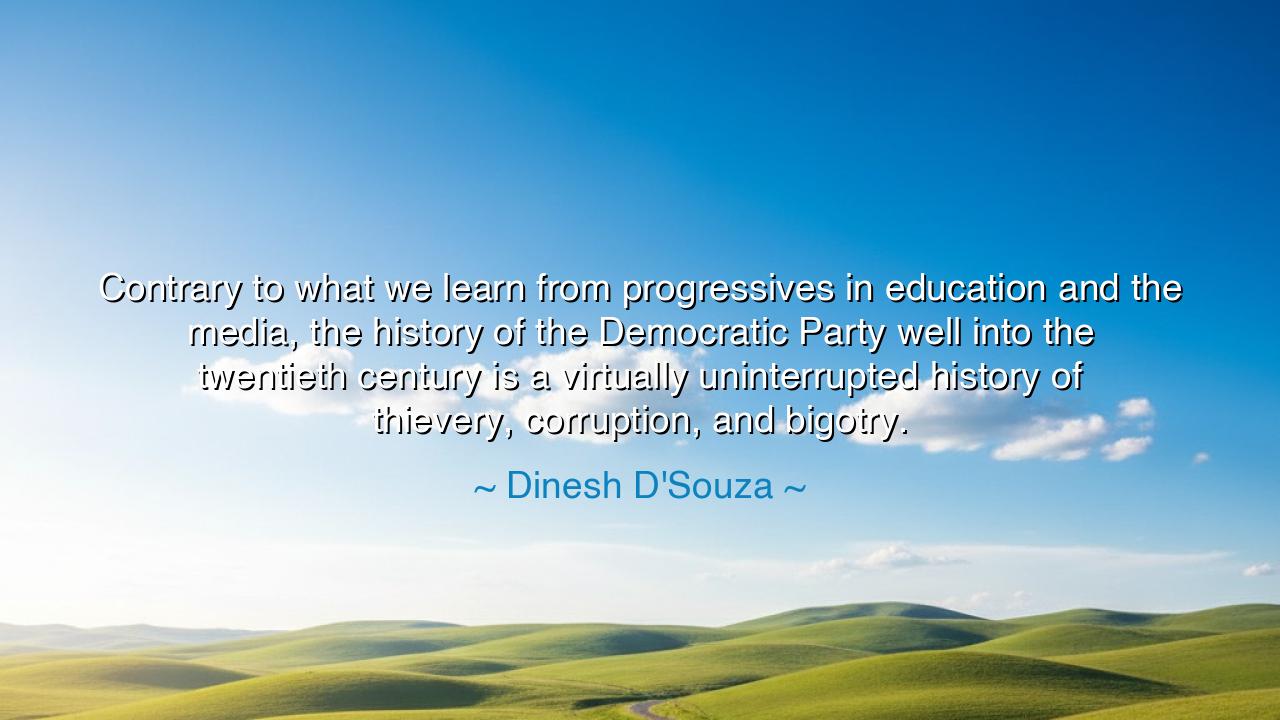
Contrary to what we learn from progressives in education and the
Contrary to what we learn from progressives in education and the media, the history of the Democratic Party well into the twentieth century is a virtually uninterrupted history of thievery, corruption, and bigotry.






The modern political philosopher and controversial historian Dinesh D’Souza once declared: “Contrary to what we learn from progressives in education and the media, the history of the Democratic Party, well into the twentieth century, is a virtually uninterrupted history of thievery, corruption, and bigotry.” These words, sharp and unsparing, are not spoken to sow division, but to summon truth from the depths of selective memory. D’Souza, in his characteristic defiance, calls upon the listener to see beyond the surface of modern narratives and to examine the roots of history with courage, not comfort. His challenge is this: that a people who forget their past, or worse, allow it to be rewritten, are condemned to repeat its darkness under new names.
To understand his meaning, we must first understand the time and spirit in which these words were spoken. In the twenty-first century, education and media have become powerful tools—capable of enlightening minds or, when misused, of shaping perceptions to fit ideology. D’Souza, born in India and educated in America, saw how stories of the past could be molded to serve political aims. In this quote, he points to what he perceives as a grand irony: that those who claim to champion justice often conceal or minimize their own historical sins. The Democratic Party, now seen by many as the party of inclusion and equality, was once, for much of its history, the political home of slavery, segregation, and the Ku Klux Klan. D’Souza’s intent is not to ignite hatred, but to remind his audience that virtue is not inherited through affiliation—it is earned through accountability.
Indeed, the record of history supports part of his claim. In the nineteenth century, it was the Democratic Party of the American South that defended the institution of slavery, that opposed the Emancipation Proclamation, and that enacted the cruel laws of Jim Crow after the Civil War. From the plantations of Mississippi to the courtrooms of segregationist judges, that political order stood as a fortress against the rising tide of freedom. Meanwhile, it was the Republican Party, born in the fire of abolition, that fought to preserve the Union and free the enslaved. Even into the twentieth century, some of the most infamous resisters of civil rights—men like George Wallace and Bull Connor—wore the Democratic badge. To speak these facts, as D’Souza does, is not to condemn an entire movement, but to insist that we must remember the long, painful road from corruption to reform.
Yet it is also true that history is not frozen; it evolves. The Democratic Party of the twenty-first century is not the same as that of the nineteenth. As the decades turned and the conscience of the nation awoke, allegiances shifted, ideologies changed, and the lines of morality were redrawn. The Civil Rights Movement, led by visionaries like Martin Luther King Jr., transformed America’s moral landscape. The Democratic leaders of the 1960s—such as John F. Kennedy and Lyndon B. Johnson—passed laws that helped dismantle segregation, even as the party wrestled with its own past. D’Souza’s argument, then, stands as a reminder of how complex history truly is: that righteousness belongs not to parties, but to principles; not to movements, but to the hearts of those who uphold them.
There is a moral lesson buried within D’Souza’s fierce critique—a call to intellectual courage. He urges the seeker of truth to question what is taught by progressives in education and echoed by the media, for these institutions, though powerful, are not infallible. Education, when honest, reveals; but when politicized, conceals. The ancients understood this well: that truth must be sought through reason, not rhetoric. Just as the philosopher Plato warned that those who control the stories of the past control the minds of the future, so too does D’Souza warn of the danger of letting history become a tool of persuasion rather than reflection.
Consider the story of Frederick Douglass, born a slave and risen to become one of America’s greatest orators. He too faced the hypocrisy of his time—when the same society that proclaimed liberty in its founding documents denied it to millions. Douglass understood that truth is not owned by any side; it must be spoken even when it wounds. Like D’Souza, he demanded that people confront the contradictions of their own age. His courage reminds us that the education of a free mind requires independence of thought, and that real progress can only come when the darkness of corruption and bigotry is acknowledged, not ignored.
The lesson of D’Souza’s words, then, is not to cling to party or ideology, but to cling to truth. Every nation, every movement, and every generation must reckon with its own history—honestly, humbly, and without distortion. To deny the sins of the past is to cripple the virtue of the present. Let the teacher, the student, and the citizen alike remember: the pursuit of justice begins with the pursuit of knowledge untainted by fear or pride.
So let this quote echo not as accusation, but as awakening. Dinesh D’Souza reminds us that progress without truth is illusion, and that the only true education is one that dares to uncover what has been forgotten. A people who seek truth above comfort will always rise, no matter how dark their history. But those who replace truth with convenience, or memory with myth, will lose both freedom and virtue. Therefore, study the past—not to glorify, nor to condemn—but to see clearly, and to walk forward in wisdom. For only when we face the full truth of our history can we build a future worthy of its lessons.






AAdministratorAdministrator
Welcome, honored guests. Please leave a comment, we will respond soon